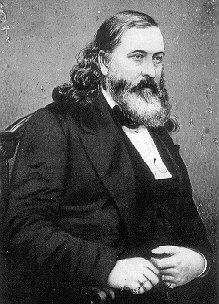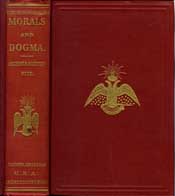 No discussion of anti-Masonry would be complete without an extensive mention of Albert Pike. The flyleaf of a biography written by Mason Jim Tresner describes him as "...a pioneer, a crusader for justice for Native Americans, a practical joker, a reformer, a journalist, a philosopher, a prominent Washington lawyer, and a Civil War general." For many years, he was leader of the Scottish Rite in the southern United States and he was the author of Morals and Dogma published in 1871. The title in and of itself has led to much confusion since those who are not Masons will automatically assume this book sets forth 'dogma' for Freemasonry. Nothing could be further from fact.
No discussion of anti-Masonry would be complete without an extensive mention of Albert Pike. The flyleaf of a biography written by Mason Jim Tresner describes him as "...a pioneer, a crusader for justice for Native Americans, a practical joker, a reformer, a journalist, a philosopher, a prominent Washington lawyer, and a Civil War general." For many years, he was leader of the Scottish Rite in the southern United States and he was the author of Morals and Dogma published in 1871. The title in and of itself has led to much confusion since those who are not Masons will automatically assume this book sets forth 'dogma' for Freemasonry. Nothing could be further from fact.
Let's clarify right at the outset: the vast majority of those who become Masons have no idea whatsoever who Pike was. In fact, most Masons throughout the world become members and will eventually die without ever encountering either him or any of his works. In fact, of all the Masons world-wide, it's likely that fewer than 2% will have ever even seen (much less read) a copy of any of his hundreds of writings, most of which have been relegated to the dustbin of history. Of the few who have, what they're familiar with will - almost without exception - be Morals and Dogma, a book that anti-Masons delight in holding up as the 'Bible' of Freemasonry.
But what are the facts about this book? For about 60 years, it was given as a memento to all who joined the Southern United States jurisdiction of the Scottish Rite, an appendant body of Freemasonry. In the earliest printings, due to the cost of publishing books, there was an instruction inside that it was to be returned to the Supreme Council in the case of death of the owner. Of course, there was no way to enforce that and in a majority of cases, it was ignored. As book publishing costs became less onerous, that request was dropped in later editions. Those who find such a request nefarious (it was not an order and certainly impossible to enforce), ignore the reality of the times.
We'd guess that of the few who actually begin reading this ponderous 850+ page tome, only a small percentage actually finish it. Of those who do, the great majority admit that they could barely understand it. (Lately, with the advent of various book comparison online venues, it would seem that far more non-Masons have read the book than Masons!) Yet despite this, anti-Masons assert that Pike and his works exert significant influence over Freemasonry today. Let's be clear: the book was never given to all Masons and it has never, ever (not once, anywhere, anytime) been used as a 'textbook' or 'instruction' for Masons.
 Morals and Dogma is a philosophical work, created by an individual who was an extraordinarily prolific writer even for an age when prolific writing was the norm. It was also fashioned in the style of Pike's time when public speaking was a high art form and Pike was known far and wide for his skills in this area. Morals and Dogma is not a manifesto (i.e. public declaration of principles, policies, or intentions) for Masonry or even for the Scottish Rite's Southern Jurisdiction. It is, rather, an attempt by Pike to provide a framework for understanding religions and philosophies of the past. Pike believed that without knowing the history of a concept, one couldn't grasp the concept itself - and thus his lengthy explanations of various religious beliefs, consistent with knowledge of those beliefs in the mid-1800s.
Morals and Dogma is a philosophical work, created by an individual who was an extraordinarily prolific writer even for an age when prolific writing was the norm. It was also fashioned in the style of Pike's time when public speaking was a high art form and Pike was known far and wide for his skills in this area. Morals and Dogma is not a manifesto (i.e. public declaration of principles, policies, or intentions) for Masonry or even for the Scottish Rite's Southern Jurisdiction. It is, rather, an attempt by Pike to provide a framework for understanding religions and philosophies of the past. Pike believed that without knowing the history of a concept, one couldn't grasp the concept itself - and thus his lengthy explanations of various religious beliefs, consistent with knowledge of those beliefs in the mid-1800s.
Sem comentários:
Enviar um comentário